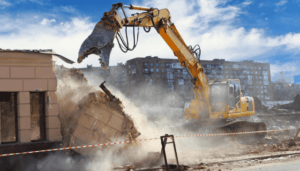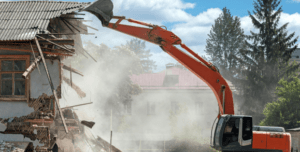Demolition is an essential process for urban renewal and construction projects, but it comes with significant considerations, especially concerning nearby properties. The impact of demolition on surrounding areas can be substantial, influencing both residential and commercial environments. Understanding these effects and implementing strategies to minimize them is crucial for maintaining community harmony and ensuring safety. In this blog, we will explore how demolition affects nearby properties and discuss effective measures to mitigate these impacts, particularly in the context of commercial demolition.
Understanding the Impact of Demolition
Demolition, whether residential or commercial, involves dismantling structures, which inevitably affects the environment around it. The primary concerns include:
- Structural Safety: Demolition activities can potentially cause vibrations and disturbances that may impact the structural integrity of nearby buildings. This is particularly critical in densely built areas where commercial demolition might be taking place close to other commercial properties.
- Dust and Debris: Demolition generates significant amounts of dust and debris, which can affect air quality and create a mess in surrounding areas. For commercial demolition, this can mean more extensive debris, potentially impacting businesses and pedestrian traffic.
- Noise Pollution: The noise from demolition activities can be disruptive to nearby properties, especially in commercial areas where businesses operate during regular hours.
- Traffic Disruption: In commercial areas, demolition can cause road closures and traffic disruptions, affecting local businesses and daily commutes.
Minimizing the Impact of Demolition
- Thorough Planning and Preparation
Effective planning is crucial to minimizing the impact of demolition on nearby properties. This includes:
- Site Assessments: Conduct detailed assessments to understand the proximity of neighboring buildings and potential risks.
- Impact Analysis: Evaluate how demolition activities might affect adjacent structures, particularly in commercial demolition projects where the scale might be larger.
- Permits and Regulations: Ensure compliance with local regulations and obtain necessary permits to avoid legal issues and ensure safety standards are met.
- Utilizing Advanced Demolition Techniques
Adopting advanced demolition techniques can significantly reduce the impact on nearby properties:
- Controlled Demolition: Techniques such as implosion or selective demolition allow for precise control over the dismantling process, minimizing vibrations and debris.
- Dust Suppression Systems: Use water sprays or other dust suppression technologies to control airborne particles and keep the surrounding environment clean.
- Noise Control Measures: Implement noise-reducing equipment and conduct demolition activities during off-peak hours to minimize disturbances to nearby businesses and residents.
- Communication and Coordination
Effective communication with stakeholders is essential to manage the impact of demolition:
- Informing Neighbors: Notify nearby property owners and businesses about the demolition schedule and potential impacts. This helps them prepare and make necessary adjustments.
- Collaboration with Local Authorities: Work closely with local authorities to manage traffic disruptions and ensure safety measures are in place.
- Regular Updates: Provide regular updates on the progress of demolition to keep the community informed and address any concerns promptly.
- Implementing Safety Measures
Ensuring the safety of nearby properties during demolition involves several key measures:
- Structural Monitoring: Use sensors and monitoring systems to track vibrations and structural movements, ensuring that nearby buildings remain safe.
- Secure Perimeters: Establish secure perimeters around the demolition site to prevent unauthorized access and protect neighboring properties.
- Waste Management: Properly manage and dispose of debris to prevent environmental contamination and ensure that the site remains orderly.
Special Considerations for Commercial Demolition
When it comes to commercial demolition, the stakes are often higher due to the scale and complexity of the projects. Consider the following additional measures:
- Business Continuity Planning: Develop a plan to minimize disruption to nearby businesses, including scheduling demolition activities during non-peak hours or coordinating with local businesses to manage their operations around the demolition site.
- Enhanced Safety Protocols: Implement stricter safety protocols to address the increased risks associated with commercial demolition, such as handling hazardous materials or dealing with larger structures.
- Economic Impact Assessments: Evaluate the potential economic impact on nearby commercial properties and develop strategies to mitigate any negative effects, such as providing alternative access routes or compensatory measures for affected businesses.
Conclusion
Demolition, whether residential or commercial, is a significant process that requires careful planning and execution to minimize its impact on nearby properties. By adopting advanced techniques, communicating effectively with stakeholders, and implementing robust safety measures, you can reduce disruptions and protect the surrounding environment.
If you’re planning a demolition project and want to ensure minimal impact on your surroundings, contact Delta Demolition today. Our expert team is ready to help you navigate the complexities of demolition with precision and care. Call us now or visit our website to learn more about our services and request a consultation.






